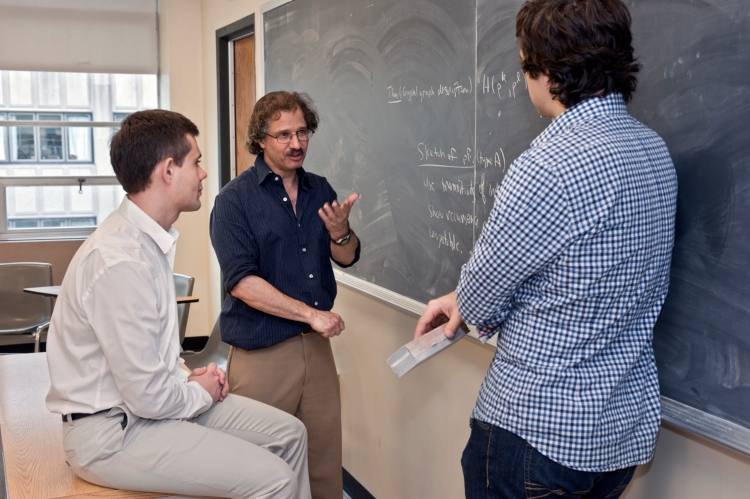
By
Only two years after its establishment, the Mathematics Department’s doctoral program is already having a positive impact.
The PhD program has drawn not only top students from around the world interested in pursuing mathematics at the highest level, but also a high caliber of faculty and unprecedented research funding. In fact, according to Mathematics chairman Professor Solomon Friedberg, the department currently has the highest number of faculty members holding external grants in its history.
“Good things are happening in the department,” said Friedberg. “We are attracting outstanding scholars and teachers who will have an impact at the University for years to come. They are coming to us from the very best schools.”
This fall, the department welcomed Assistant Professors Ian Biringer, Maksym Fedorchuk and David Treumann, all of whom have been awarded funding for their research from the National Science Foundation (NSF). They joined other NSF-funded Assistant Professors John Baldwin, Dawei Chen, Dubi Kelmer, Joshua Greene and Eli Grigsby, who won a NSF Career Award last spring.
In addition, Friedberg and Professor Avner Ash have received a National Security Agency grant and Professor Ben Howard was awarded new NSF funding, while Professor G. Robert Meyerhoff was selected for a Simons Fellowship.
The department enrolled its third group of PhD students this fall, bringing the total number of doctoral students to 15.
“We’re very excited about the quality of these students. They are coming from places like Stanford, Johns Hopkins, Williams, as well as foreign universities,” said Friedberg, who expressed gratitude for the University administration’s support of the department. “It’s a very competitive program. I’m fielding inquiries from all over the world.”
“There is no doubt that the [Mathematics] department is among the strongest at Boston College,” said Provost and Dean of Faculties Cutberto Garza. “This can be credited to the superb leadership of Sol Friedberg and to the faculty's commitment to outstanding scholarship, research, and service to BC and the wider academic community. It is clear that the intellectual energy in the department--among faculty and students alike--is at an all-time high. It will be exciting to see what the next few years will bring.”
The rising academic profile of the graduate program has also enhanced the undergraduate program, noted Friedberg, who said the number of undergraduates going on to graduate studies has increased, as has the number of undergraduates taking graduate-level courses within the department. There are currently some 240 math majors, 74 of them in the rigorous bachelor of science track.
The department has also introduced two new honors courses for undergraduates, Multivariable Calculus and Linear Algebra.
Undergraduate mathematics majors are taking advantage of research opportunities both on and off campus, according to Friedberg. Six math majors attended summer research and training programs at prestigious institutions such as Brown, Cornell and Princeton. Last academic year, three students attended the Nebraska Conference for Undergraduate Women in Mathematics.
Next April, Boston College will host the Spring Eastern Sectional meeting of the American Mathematical Society, at which a number of Mathematics faculty members will participate.
In yet another development, last year the department established the BC Math Alumni Network, a resource for mathematics majors to seek out career advice and mentoring from some 60 alumni who are putting their math degrees to use in fields such as teaching, finance, information technology, archaeology and medicine.
“It is a way for us to share with our present students the wide range of opportunities that exist for math majors,” said Friedberg. “Math is a universal construct and our alumni have a wonderful level of achievement.”



